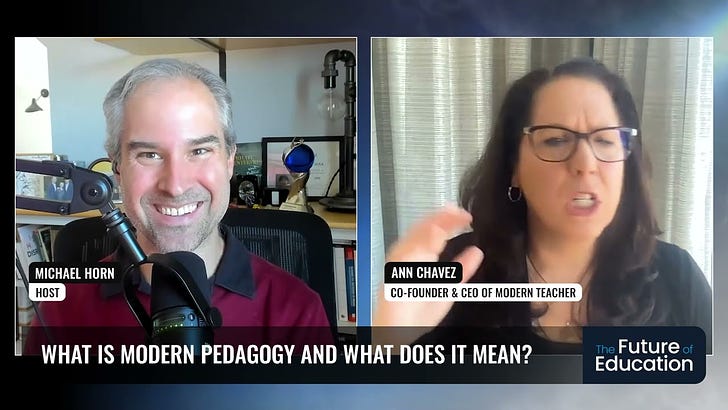As CEO and the founder of ModernTeacher, Ann Chavez helps school districts transition from the traditional classroom to modern learning environments. “Change readiness and setting conditions for change are pieces that sometimes we just don’t stop and breath and take the time to do,” she told me in this conversation that centered on ModernTeacher's theory of change and desire for impact in school districts. The conversation was illuminating to me—from how Chavez defines “modern pedagogy” and “modern learning” to get out of the various buzzwords that compete for airtime in education to the notion of a network of districts working together to transform. As always, you can listen to the conversation here or wherever you listen to your podcasts, watch it below, or read the transcript.
Michael Horn: Ann, welcome to The Future of Education. Thank you so much for being here with us today.
Ann Chavez: Hey, Michael. Great to be here. Super excited for this conversation.
Horn: Yeah. Well, let's ground people in the conversation a little bit before we get to geek out in the places we're really passionate about how you're transforming teaching and learning in actual schools out in the world. But first, what is Modern Teacher itself?
Chavez: Yeah. So Modern Teacher, we are a network of forward thinking districts who want to shift the student experience, think differently about how we deliver school. We are public school districts who say we can make a difference and they are providing and creating amazing programs and options for students across the country.
Horn: That's awesome. So tell us the story of how you decided to create this with your co-founders. What was the problem that you saw or the opportunity with districts that you said we got to really go seize this and start to change that practice.
Chavez: Absolutely. So two co-founders, we had been working in some systems together, a couple of different systems across the US, big and small. And at the time we were working in a very large, the third largest system in the nation in Chicago public schools, and we had a leader there that really empowered area superintendents to have some autonomy to go create an option. We had very high transparency, very high management to goals and long as you were moving in that direction and able to shift and adjust and be able to understand and tell that story, you were able to have the autonomy and the resources to go create what your area needed. Districts are diverse, communities all over our country are diverse and we had that experience and realize that some of the things that really hold us back in systems are the system itself. We can't get out of our own way to be able to go and really put into place and help teachers and leaders grow to be able to do their best work.
And we said how can we take and replicate this because it's pretty unique. The leader at the time didn't come from education and was running this large school system and we thought every district should be able to experience this and we can create things for every student. We can build these options but our system doesn't help itself. So what could we do to help that and how could we create some things to make school districts more systems thinking and sometimes think outside the box or run different than a traditional school district. And that's where Modern Teacher was born and we started to learn and listen and we got some really nice investors at the time that also wanted to understand this better.
And we traveled the country and we visited and talked with districts that were really making shift but shift at scale, not shift of a couple of classrooms or a pilot program or an initiative or we're going to try something. They led through a big vision and how was that coming to life. And we said, what are the leaders doing? Superintendents, assistant superintendents, leaders of professional development and curriculum and teaching and learning. What were teachers doing? What were principals doing? What was happening in communities where they were getting movement? And we started to codify those shifts that were happening. And over about a three year time period, we built what we call today our digital convergence framework. And it's the framework we use today that helps districts navigate the path forward to bring their vision of modern learning to life.
Horn: So I actually want to dig in right there around that framework itself that you've created and that you help take districts through this sense of empowerment for teachers and school leaders on the ground and really fragmenting out the system if you will that you did in Chicago. What does this framework actually look like as you've constructed it and the journey if you will maybe of a district when they start to work with you and become part of the network?
Listen to this episode with a 7-day free trial
Subscribe to The Future of Education to listen to this post and get 7 days of free access to the full post archives.













